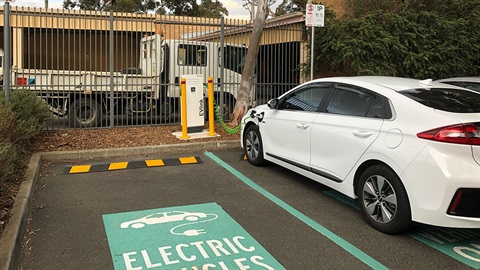Northern Councils unite in call for better transport infrastructure
Published on 05 October 2023

Seven councils from Melbourne’s northern suburbs have released the final element of a blueprint for the region’s transport future.
In response to traffic congestion, up to hour-long trips to the nearest hospital and rising greenhouse emissions from unsustainable transport options, seven councils from Melbourne’s northern suburbs have released the final element of a blueprint for the region’s transport future.
The Northern Councils Alliance today launched its Community Electric Vehicle Transition Plan, part of an evidence-based regional transport plan.
Like the NCA’s Northern Region Transport Strategy and Bus Networks Study, the Community Electric Vehicle Transition Plan offers evidence-based recommendations for improving transport options across Melbourne’s north.
Melbourne’s north is home to one million people or 20% of the population of Greater Melbourne. It’s one of the fastest growing regions, with a population of 1.5 million forecast by 2036 – a growth rate of 2.8% compared to 1.6% for Greater Melbourne. One in six Victorians live in the northern Melbourne region.
But this population growth has not been matched with the necessary investment in transport. Over the years this has caused massive road congestion and delays in connecting between transport options – limiting business growth and access to employment, education and health services. A lack of planning and investment is also impeding the transition to electric vehicles.
The Community Electric Vehicle Transition Plan provides a framework for a sustainable regional transport system and the transition to electric vehicles. It was developed in response to community requests for public electric vehicle charging and growing concerns about the region’s ability to respond to this need.
A key opportunity identified in the plan is a comprehensive active transport network, including walking, cycling and micro mobility e-bikes and e-scooters. This includes supporting the charging of micro mobility in public realm and electric micro mobility share schemes.
Developed by the municipalities of Banyule, Darebin, Hume, Merri-bek, Mitchell, Nillumbik and Whittlesea, in conjunction with various regional stakeholders, the three regional transport advocacy documents were funded by the Northern Metropolitan Partnership.
The NCA is calling on the federal and state governments to act on the transport blueprint by integrating it into their planning and funding the identified transport infrastructure and services. It is vital that the region’s transport system can support future growth while safeguarding and improving livelihood, liveability and action on sustainability goals. Ongoing strategic and coordinated planning is needed to ensure that the broader needs of the community are met with investment in transport infrastructure.
“With our region’s growth, planning and investment in transport options is critical. Our seven Councils are responding to this issue and are working together to support state and federal government plans for our community,” said Cr Joseph Haweil, Mayor of Hume Council and Chair of the NCA.
Cr Haweil said this is a great example of Councils working together and providing a blueprint for the future of transport in their region. “These documents include comprehensive analysis of the electric vehicle infrastructure needs across Melbourne’s north. With our population tipped to reach 1.5 million by 2036, we need to support our economy and improve our community’s access to essential services. Investing in this critical infrastructure will be key to doing just that.”
Cr Peter Castaldo, Mayor of Banyule Council said: “Electric vehicles are the future. We need to work now to make sure our residents and businesses can make the transition smoothly and efficiently. We also need to champion the use of all types of active transport and provide the infrastructure that is needed for bike paths and walking trails across Melbourne’s north.”
Cr Julie Williams, Mayor of Darebin Council said: “Moving people in and out of the city every day is not a recipe for growing local jobs. Being able to move people between our precincts, such as from Broadmeadows to Epping to La Trobe NEIC to the future precinct of Cloverton, will be the key to allowing residents to access employment, reducing congestion. In addition, infrastructure to support the use of electric vehicles will decrease emissions and help us reach our targets.”
Cr Fiona Stevens, Mayor of Mitchell Shire Council added: “Population growth has not been matched with investment in transport options and many of our residents face long commutes, with massive road congestion and delays in transport connections. This limits access to employment, education and health services. If we don’t take a long-term view to strategic planning and investment, we will be playing catch up forever and our communities will miss out on accessing vital services.”
Cr Ben Ramcharan, Mayor of Nillumbik Shire Council said: “A high-quality regional trails network will provide desirable, safe and accessible transport and recreation opportunities for residents and visitors. Together with provision of integrated bus routes, this will significantly lift the number of transport options available and improve the health and wellbeing of our community.”
Cr Angelica Panopoulos, Mayor of Merri-bek Council said: “Connectivity is key to our residents having access to jobs, health and education. Rail options must improve, for example along the Upfield Line, and both inner and growth areas urgently need better bus services.”
“For our state to succeed, Melbourne’s north needs to succeed. Investment in the future, in terms of access to health and community services, improved transport options and infrastructure to support electric vehicles, will be critical to our economic future,” said Lydia Wilson, Chair of Administrators at the City of Whittlesea.
- To read the Community Electric Vehicle Transition Plan, Northern Region Transport Strategy and Northern Region Transport Study Stage 2: Bus Networks (Bus Networks Study), visit the Northern Councils website.
Contact
Melissa Atallah, Executive Officer
0439 660 993
melissa.atallah@northerncouncils.org.au